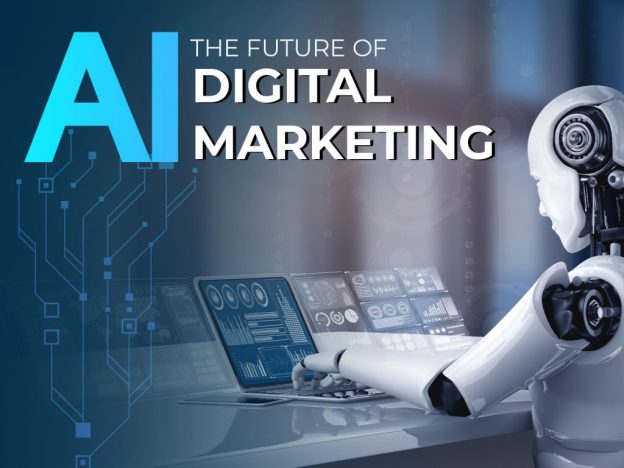So you’re wondering if AI will take over digital marketing, huh? Well, let me tell you, it’s an intriguing question that many experts in the industry are pondering. With the rapid advancements in artificial intelligence technology, it’s hard to ignore the potential impact it could have on the world of digital marketing. From automated customer interactions to personalized content delivery, AI systems are already revolutionizing the way businesses connect with their target audience. But will it completely replace human marketers? That’s a question that we’ll explore in this article.
The Current Role of AI in Digital Marketing
Automated Ads
AI has revolutionized the way advertisements are created and targeted. With the help of machine learning algorithms, digital marketers are now able to automate the process of creating and optimizing ads. These algorithms analyze vast amounts of data to identify patterns and trends, allowing marketers to create highly targeted and personalized advertisements. By leveraging AI, businesses can save time and resources, while also improving the effectiveness of their ad campaigns.
Content Generation
Creating high-quality content that resonates with the target audience can be a time-consuming and challenging task. AI has the potential to alleviate this burden by automating the content generation process. Natural Language Processing (NLP) technology allows AI systems to understand and generate human-like text. From blog posts and social media updates to product descriptions and email newsletters, AI can generate content that is not only grammatically correct but also engaging and relevant to the target audience.
Chatbots and Virtual Assistants
Chatbots and virtual assistants powered by AI have become increasingly popular in the field of digital marketing. These intelligent systems can interact with customers in a conversational manner, providing them with personalized recommendations, answering their queries, and even assisting with transactions. The 24/7 availability of chatbots ensures that customers receive prompt and efficient support, leading to enhanced customer satisfaction and loyalty. By leveraging AI-powered chatbots, businesses can also automate lead generation and qualification processes, allowing their sales teams to focus on more critical tasks.
Data Analysis and Insights
With the vast amount of data available in the digital landscape, businesses need efficient tools to extract valuable insights and make data-driven decisions. AI algorithms excel in data analysis and can identify patterns, trends, and correlations that may go unnoticed by humans. Through the use of machine learning, AI can quickly analyze large data sets to uncover actionable insights. This allows marketers to optimize their campaigns, target the right audience, and personalize their marketing efforts for maximum impact.
Benefits of AI in Digital Marketing
Improved Personalization
One of the most significant benefits of AI in digital marketing is improved personalization. By leveraging AI algorithms and data analytics, businesses can gather and analyze vast amounts of customer data. This data can then be used to create highly personalized and targeted marketing campaigns. From personalized product recommendations to tailored email marketing, AI enables businesses to deliver relevant content and offers to individual customers, enhancing their overall experience.
Enhanced Customer Experience
AI technologies like chatbots and virtual assistants can significantly enhance the customer experience. These intelligent systems can provide immediate assistance and personalized recommendations, making it easier for customers to find the information they need and make informed purchasing decisions. By automating repetitive tasks and streamlining customer support, businesses can provide a seamless and efficient customer experience, leading to higher customer satisfaction and loyalty.
Increased Efficiency and Productivity
By automating various marketing tasks, AI can significantly increase efficiency and productivity. AI-powered tools can handle repetitive and time-consuming tasks such as ad creation, content generation, and data analysis. This frees up valuable time for marketers to focus on more strategic and creative initiatives. Additionally, AI can automate processes like lead generation and qualification, enabling businesses to scale their marketing efforts without the need for significant human intervention.
Data-driven Decision Making
AI enables marketers to make data-driven decisions by extracting valuable insights from large volumes of data. The algorithms used in AI systems can analyze complex patterns and trends in data, providing marketers with actionable insights. These insights can then be used to optimize marketing campaigns, improve targeting, and drive better results. By relying on data rather than guesswork, marketers can make more informed decisions that are likely to yield positive outcomes.
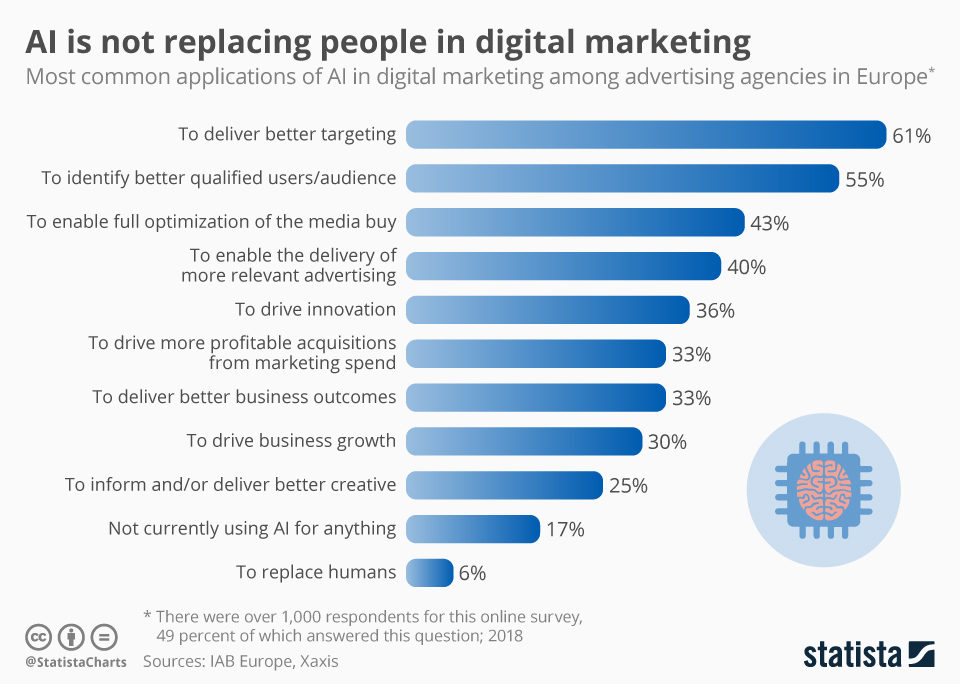
This image is property of cdn.statcdn.com.
AI’s Impact on Advertising
Automated Ad Targeting
AI has revolutionized ad targeting by enabling businesses to reach their target audience with greater precision. AI algorithms analyze vast amounts of customer data, including browsing behavior, demographics, and interests, to determine the most relevant audience for a particular ad. This allows marketers to create highly targeted campaigns that are more likely to resonate with their desired audience, leading to higher conversion rates and ROI.
Dynamic Ad Campaigns
With the help of AI, marketers can create dynamic ad campaigns that adapt and personalize content based on user behavior and preferences. AI algorithms can analyze real-time data, such as search queries and browsing history, to determine the most relevant ad content for each individual. By delivering personalized and dynamic ads, businesses can capture the attention of their target audience and increase the chances of conversion.
Real-time Bidding (RTB)
AI has also revolutionized the way advertisers bid for ad placements through real-time bidding (RTB). RTB allows advertisers to bid for ad impressions in real-time, targeting specific audience segments based on various parameters. AI algorithms can analyze data such as user behavior and ad performance to determine the optimal bid for a particular ad placement. This ensures that advertisers only pay for ad impressions that are more likely to yield positive results, maximizing their ad spend.
Content Creation and Curation with AI
Automated Content Generation
AI-powered tools can automate the process of content generation, making it easier for businesses to scale their content marketing efforts. By leveraging Natural Language Processing (NLP) algorithms, AI systems can generate human-like text on a wide range of topics. From blog posts and social media updates to product descriptions and email newsletters, AI can assist in creating fresh and engaging content. This not only saves time for marketers but also ensures a steady stream of high-quality content for their target audience.
Content Recommendations
AI can also play a crucial role in content curation by providing personalized recommendations to users. By analyzing user behavior, AI algorithms can suggest relevant articles, blog posts, videos, and other types of content to individual users. This helps businesses increase user engagement and retention by delivering content that matches the user’s interests and preferences. Content recommendations powered by AI can significantly enhance the user experience and drive higher levels of user engagement.
Content Optimization
AI can assist marketers in optimizing their content for better visibility and engagement. AI algorithms can analyze factors such as keyword usage, readability, and relevance to determine the effectiveness of a piece of content. By providing insights and recommendations for improvement, AI tools can help marketers create content that is optimized for search engines and resonates with their target audience. This ensures that businesses can maximize the impact of their content and improve their organic search rankings.
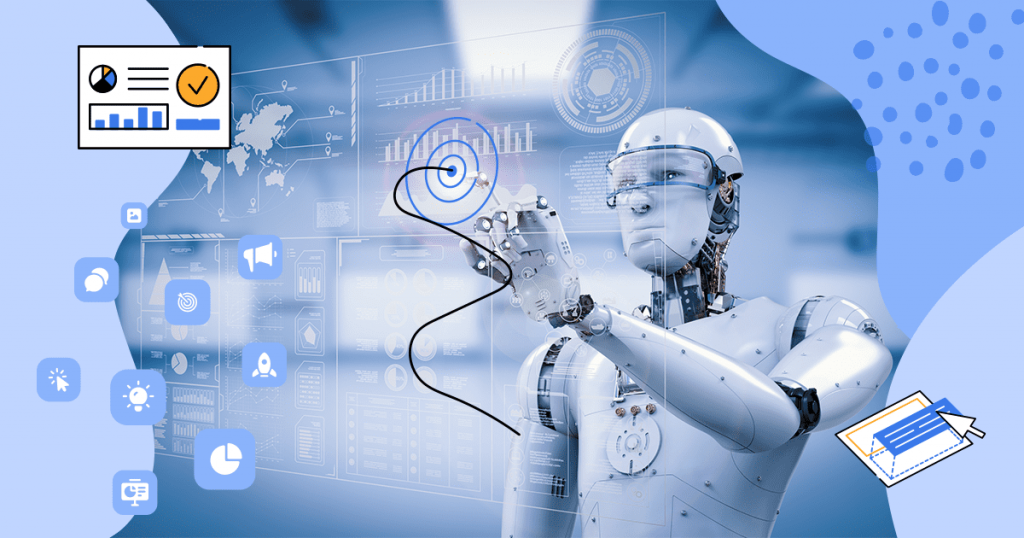
This image is property of rockcontent.com.
The Rise of Chatbots and Virtual Assistants
24/7 Customer Support
Chatbots and virtual assistants powered by AI have transformed the way businesses provide customer support. These intelligent systems can handle customer queries and provide solutions in real-time, 24/7. By automating customer support, businesses can ensure that their customers receive prompt and efficient assistance at any time of the day. This leads to higher customer satisfaction, reduced response times, and increased customer loyalty.
Personalized Interactions
AI-powered chatbots and virtual assistants can provide personalized interactions to customers, improving their overall experience. These intelligent systems can analyze customer data and preferences to deliver tailored recommendations and assistance. By understanding customer needs and preferences, businesses can provide a more personalized and engaging interaction that makes customers feel valued and understood.
Lead Generation and Qualification
Chatbots and virtual assistants can also play a crucial role in lead generation and qualification. By initiating conversations with website visitors, AI-powered chatbots can collect relevant customer information and qualify leads based on predetermined criteria. This streamlines the lead generation process and helps businesses identify and prioritize high-quality leads. By automating lead qualification, businesses can optimize their sales efforts and improve conversion rates.
Harnessing AI for Data Analysis and Insights
Pattern Recognition
AI excels at pattern recognition, allowing businesses to identify trends and patterns in their data. By analyzing large volumes of data, AI algorithms can identify correlations and relationships that may not be apparent to human analysts. This enables businesses to make more data-driven decisions and uncover valuable insights that can inform their marketing strategies. From identifying customer behavior patterns to predicting market trends, AI-powered data analysis can provide businesses with a competitive advantage.
Predictive Analytics
One of the most valuable applications of AI in data analysis is predictive analytics. By analyzing historical data and identifying patterns, AI algorithms can make predictions about future trends and outcomes. This allows businesses to anticipate customer behavior, identify market opportunities, and optimize their marketing efforts for better results. Predictive analytics powered by AI can help businesses stay ahead of the competition and make informed decisions based on data-driven insights.
Customer Segmentation
AI can also assist businesses in segmenting their customer base for more targeted marketing campaigns. By analyzing customer data, AI algorithms can group customers based on various criteria, such as demographics, behavior, and preferences. This segmentation enables businesses to tailor their marketing messages and offers to different customer segments, increasing the relevance and effectiveness of their campaigns. By leveraging AI for customer segmentation, businesses can maximize their marketing ROI and drive higher levels of customer engagement.
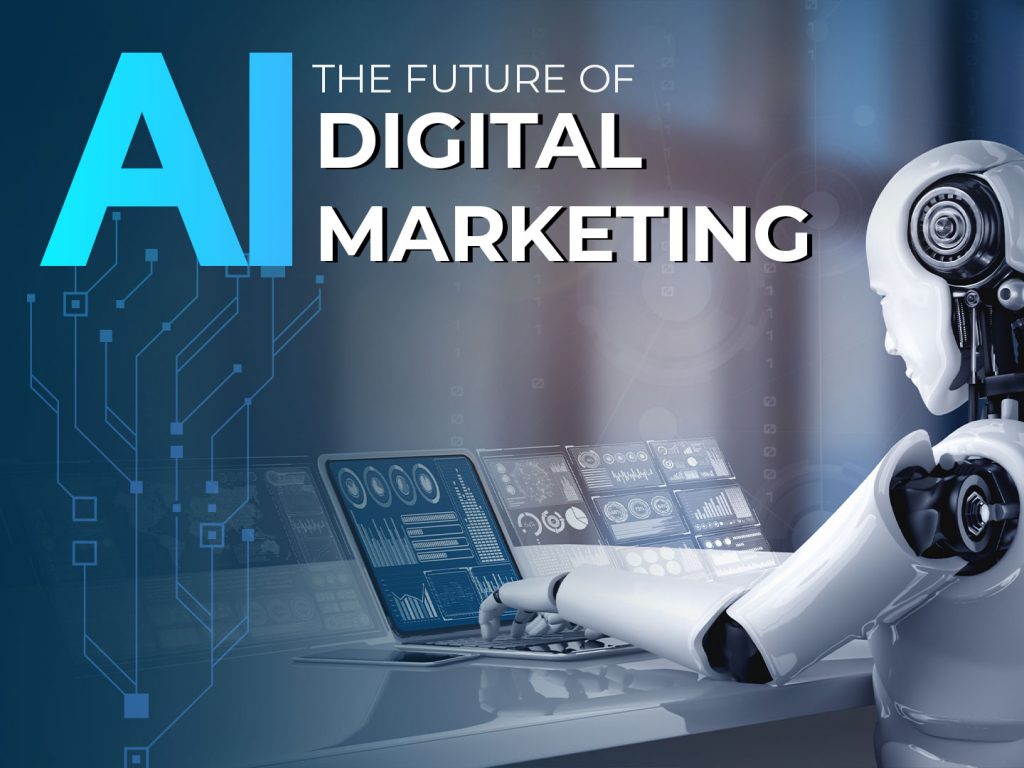
This image is property of tscfm.org.
Challenges and Limitations of AI in Digital Marketing
Lack of Human Touch
One of the main challenges of implementing AI in digital marketing is the potential lack of human touch. While AI can automate various tasks and provide personalized recommendations, it may lack the empathy and emotional intelligence that human interactions offer. Businesses must strike a balance between automation and human involvement to ensure that customers still feel valued and understood.
Ethical Concerns
The use of AI in digital marketing raises ethical concerns related to data privacy and manipulation. Businesses must ensure that they are collecting and using customer data in a responsible and transparent manner. AI algorithms must be trained on unbiased and diverse datasets to prevent the perpetuation of biases and discrimination. Additionally, businesses must be transparent about the use of AI in their marketing efforts and provide clear information on how customer data is being collected, stored, and used.
Dependency on Quality Data
AI systems rely heavily on quality data to provide accurate insights and recommendations. Businesses must ensure that their data collection processes are robust and that they have access to reliable and diverse datasets. Without quality data, AI algorithms may provide inaccurate or biased recommendations, leading to suboptimal marketing outcomes. Businesses must invest in data collection and management processes to ensure the success of AI-powered digital marketing initiatives.
AI’s Potential to Revolutionize Digital Marketing
Automation of Repetitive Tasks
AI has the potential to automate repetitive tasks in digital marketing, allowing marketers to focus on more strategic and creative initiatives. By automating tasks such as ad creation, content generation, and data analysis, businesses can save time and resources, while also improving the efficiency of their marketing efforts. This automation enables marketers to scale their activities and reach a larger audience without the need for significant human intervention.
Hyper-personalization
AI enables businesses to deliver hyper-personalized experiences to customers by analyzing vast amounts of customer data. By understanding individual preferences, behaviors, and interests, businesses can tailor their marketing messages, products, and offers to each customer. This level of personalization not only enhances the customer experience but also increases the chances of conversion and customer loyalty.
Smart Content Delivery
AI can optimize content delivery by analyzing user behavior and preferences. By understanding when and how customers engage with content, businesses can deliver it at the right time and through the right channels. AI algorithms can also optimize content format and presentation to maximize user engagement. This ensures that businesses can deliver the right content to the right audience at the right time, increasing the effectiveness of their marketing efforts.
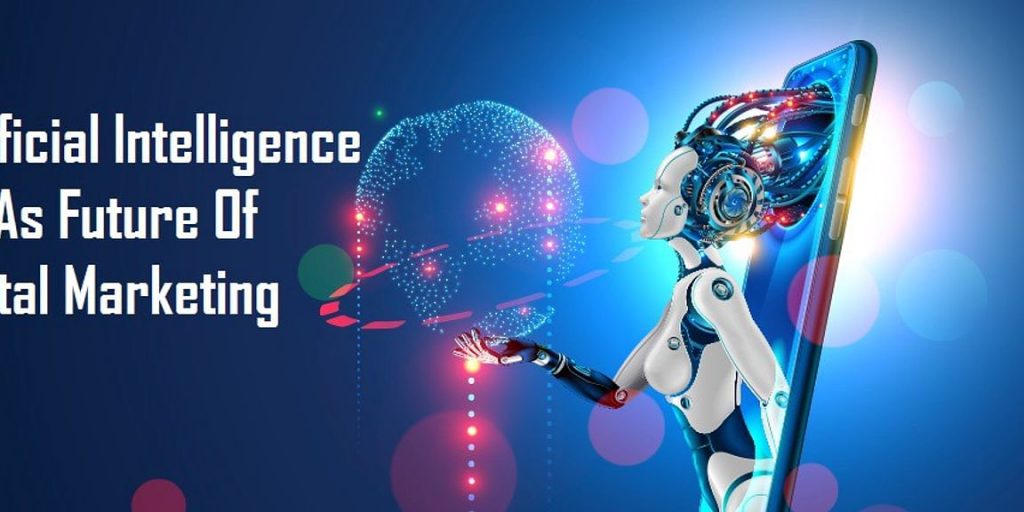
This image is property of images.yourstory.com.
The Role of Marketers in the AI Era
Creative Strategy and Branding
Despite the increasing role of AI in digital marketing, marketers still play a crucial role in developing creative strategies and branding initiatives. AI tools can assist in tasks such as content generation and data analysis, but it is the creative input and strategic vision of marketers that sets businesses apart. Marketers can leverage AI as a tool to enhance their creativity and make data-driven decisions, ultimately shaping the direction and success of digital marketing efforts.
Emotional Intelligence
While AI can automate various tasks and provide personalized recommendations, it lacks emotional intelligence and the ability to understand human emotions and desires fully. Marketers, on the other hand, have a deep understanding of customer emotions, motivations, and aspirations. By combining AI with emotional intelligence, marketers can create more impactful and relevant marketing campaigns that resonate with their target audience on an emotional level.
AI Integration and Oversight
As AI continues to play an increasingly important role in digital marketing, marketers must become proficient in AI integration and oversight. Marketers should understand how AI algorithms work, how to leverage AI tools effectively, and how to interpret the insights provided by AI systems. This requires ongoing training and learning to stay up-to-date with the latest AI advancements. Furthermore, marketers must ensure that AI-powered initiatives comply with ethical standards and data privacy regulations.
Conclusion
AI is revolutionizing the field of digital marketing, providing businesses with new and exciting opportunities to enhance their marketing efforts. From automated ads and content generation to chatbots and data analysis, AI offers numerous benefits to marketers. By automating repetitive tasks, improving personalization, and enabling data-driven decision making, AI can help businesses stay ahead of the competition and achieve better marketing outcomes. However, while AI has great potential, businesses must also navigate challenges related to the lack of human touch, ethical concerns, and the need for quality data. By embracing AI as a tool augmenting human creativity and strategic thinking, marketers can harness its power to revolutionize digital marketing and create meaningful connections with their target audience. The future of digital marketing lies in the seamless integration of AI and human expertise, enabling businesses to deliver unparalleled customer experiences and drive sustainable growth.
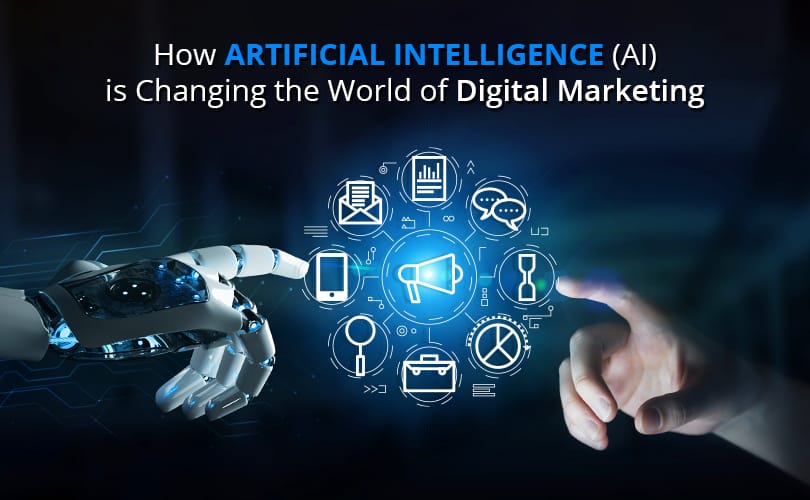
This image is property of www.cibirix.com.
